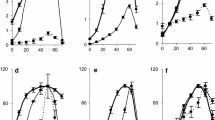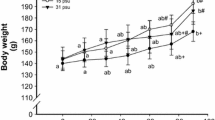Abstract
The activity of glycosidases (maltase activity and amylolytic activity) in the intestinal mucosa of juvenile common carp Cyprinus carpio (L.) under a sharp increase in water temperature depends on its physiological state (satiety or starvation). The fish are acclimated to a temperature of 22°С during the summer (young-of-the-year) and winter (yearling) seasons. An increase in water temperature at a rate of 8.0°C/h leads to an increase in amylolytic activity in well-nourished fish, but the maltase activity does not change. Starving for 3 or 10 days changes the response of glycosidase to temperature stress: the maltase activity increases, but amylolytic activity does not change. Short-term starvation does not affect the thermal tolerance of juvenile common carp; i.e., the values of the critical thermal maximum in hungry and well-nourished specimens do not differ.
Similar content being viewed by others
REFERENCES
Aminov, A.I., Vliyanie gerbitsida Raundap na aktivnost' glikozidaz ryb i ob"ektov ikh pitaniya, Extended Abstract of Cand. Sci. (Biol.) Dissertation, Nizhny Novgorod: Nizhny Novgorod State Univ., 2018.
Beitinger, T.L., Bennet, W.A., and McCauley, R.W., Temperature tolerances of North American freshwater fishes exposed to dynamic changes in temperature, Environ. Biol. Fishes, 2000, vol. 58, no. 3, p. 237. https://doi.org/10.1023/A:1007676325825
Golovanov, V.K., Ecophysiological patterns of distribution and behavior of freshwater fish in thermal gradients, J. Ichthyol., 2013, vol. 53, no. 4, p. 252. https://doi.org/10.1134/S0032945213030016
Golovanova, I.L., Golovanov, V.K., Smirnov, A.K., and Pavlov, D.D., Effect of ambient temperature increase on intestinal mucosa amylolytic activity in freshwater fish, Fish Physiol. Biochem., 2013, vol. 39, no. 6, p. 1497. https://doi.org/10.1007/s10695-013-9803-9
Hochachka, P.W. and Somero, G.N., Biochemical Adaptation. Mechanism and Process in Physiological Evolution, Oxford: Oxford Univ. Press, 2002.
Ivlev, V.S., Eksperimental’naya ekologiya pitaniya ryb (Experimental Ecology of Fish Feeding), Kiev: Naukova Dumka, 1997.
Konstantinov, A.S., Influence of temperature fluctuations on the growth, energetics, and physiological state of juvenile fishes, Izv. Akad. Nauk, Ser. Biol., 1993, no. 1, p. 55.
Kuz’mina, V.V., Digestion in Fish. A New View, Balty: LAP Lambert Acad. Publ., 2017.
Kuz’mina, V.V., Ushakova, N.V., Krylov, V.V., and Petrov, D.V., The effects of geomagnetic storms on proteinase and glycosidase activities in fish intestinal mucosa, Biol. Bull. (Moscow), 2014, vol. 41, no. 2, p. 154. https://doi.org/10.1134/S1062359014020058
Ostroumova, I.N., Biologicheskie osnovy kormleniya ryb (Biological Basis of Fish Feeding), St. Petersburg: Gos. Nauchno-Issled. Inst. Ozern. Rechn. Rybn. Khoz., 2012.
Ozernyuk, N.D., Temperaturnye adaptatsii (Temperature Adaptations), Moscow: Mosk. Gos. Univ., 2000.
Ugolev, A.M. and Kuz’mina, V.V., Pishchevaritel’nye protsessy i adaptatsii u ryb (Digestive Processes and Adaptations in Fishes), St. Petersburg: Gidrometeoizdat, 1993.
Ugolev, A.M., Iezuitova, N.N., Masevich, Ts.G., et al., Issledovanie pishchevaritel’nogo apparata u cheloveka. Obzor sovremennykh metodov (Investigation of the Digestive Apparatus in Humans: Overview of Modern Methods), Leningrad: Nauka, 1969.
ACKNOWLEDGMENTS
We are deeply grateful to V.K. Golovanov and N.S. Nekrutov for performing the water heating experiments.
Funding
This study was performed as part of State Task no. AAAA-A18-118012690102-9 and supported by Theme of the Presidium of the Russian Academy of Sciences no. 0122-2018-0001.
Author information
Authors and Affiliations
Corresponding author
Ethics declarations
Conflict of interests. The authors declare that they have no conflict of interest.
Statement on the welfare of animals. All applicable international, national, and/or institutional guidelines for the care and use of animals were followed.
Additional information
Translated by D. Martynova
Abbreviations: AA—amylolytic activity; CTM—critical thermal maximum.
Rights and permissions
About this article
Cite this article
Filippov, A.A., Golovanova, I.L. Short-Term Starvation Changes the Sensitivity of Intestinal Glycosidases of Juvenile Common Carp Cyprinus carpio L. to an Increase in the Water Temperature. Inland Water Biol 13, 334–337 (2020). https://doi.org/10.1134/S1995082920020170
Received:
Revised:
Accepted:
Published:
Issue Date:
DOI: https://doi.org/10.1134/S1995082920020170




